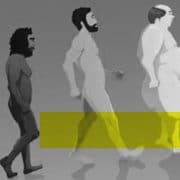We are all Cavemen in a Modern World
In the words of Charles Darwin: ‘It is not the strongest of species that survive, nor the most intelligent that survives. It is the one that is most adaptable to change.’
Our species has become the most dominant species on earth, partly because it has adapted to change better than any other species. Genetic mutations are an important part of adapting to change, but it’s important to understand that genetic mutations take thousand, if not tens of thousands of years to spread through a species through natural selection.
This has important ramifications for us. There is a quote by a researcher called Frank Booth that appeared in The Journal of Applied Physiology in 2002 – “Our genome has not changed in over 45,000 years. The current human genome requires, and expects, us to be highly physically active for normal functioning.’
So we pretty much still have the same genome as we did in our hunter-gatherer days, but our environment has changed significantly. Rather than moving lots and having periods of feast and famine, the average person now moves a lot less and has food available on every street corner – much of which didn’t even exist 50 years ago!
We’re pretty much betraying our genome by living a life it’s not cut out for! By way of comparison, the average Australian office worker takes between 3,000 and 5,000 steps per day, whereas the Amish community (who shun cars and lead traditional lifestyles) take 18,000 to 22,00 steps per day – very similar to hunter-gatherers!
What we now understand is the biological consequences of being sedentary – it has a very negative effect on our gene expression and can increase our risk of chronic diseases dramatically, as well as negatively affecting mental health. Exercise increases expression of protective genes, whereas being sedentary and chronically stressed shuts down expression of protective genes and increases expression of damaging ones.
Life as a Caveman vs Life Now
Imagine yourself as a caveman or hunter-gatherer and think about what sort of life you would be leading from the point of view of our genome. There’s no reaching for coffee, sugar or chocolate when the 4pm slump kicks in and certainly no sitting at a desk for 8 hours a day.
You’d be moving constantly, being part of a functioning tribe, hunting, gathering, looking after the tribe’s children and educating the young ones. The stress you would feel comes in spurts and is not constant. For example, there may be a lion approaching and this will put stress on the tribe, but after it’s gone you are now safe, so the stress goes with it. No desks, computers or TV, no traffic, deadlines, money worries or other sources of continuous stress.
Now compare your life now. How long do you sit each day? Do you use your car a lot? Do you feel stressed a lot of the time? If you’re hungry, you have food at hand and even when you’re not hungry, you may still eat because it’s there. How often do you eat fresh vegetables, fish and meat? How many packets of processed food are you opening each day? Sure, we have lots more enjoyable things now, but the impact of modern life on our gene expression is undeniably negative.
Our bodies are not designed to be this sedentary, to have an abundance of food (especially the processed variety), have continuous stress or even to cope with life without a tribe.
As a result, we are fatter, unhealthier and more depressed and anxious than ever and lifestyle diseases are now the biggest killer in human history.
What do you do?
Awareness is the first step! Move more, eat fresh, natural food, join groups or spend time with family. Ritualize can help this process through small, daily rituals that add up to big results over time. If you’re not part of the Ritualize tribe, check us out at www.ritualize.com. It’s a free, fun and effective tool for making long-lasting lifestyle changes.

